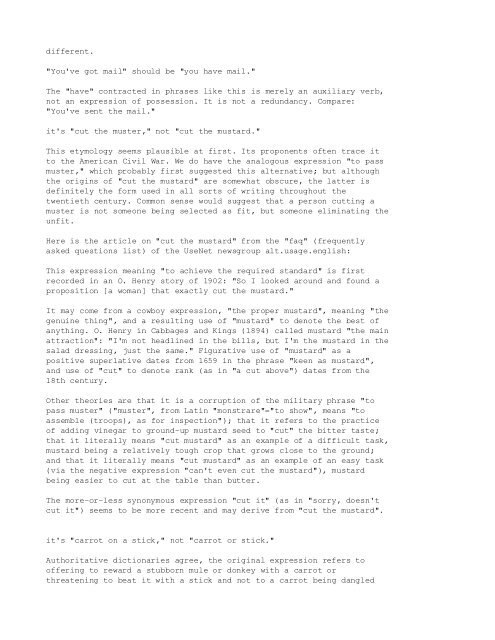Common_Errors_in_English_usage
Common_Errors_in_English_usage
Common_Errors_in_English_usage
You also want an ePaper? Increase the reach of your titles
YUMPU automatically turns print PDFs into web optimized ePapers that Google loves.
different.<br />
"You've got mail" should be "you have mail."<br />
The "have" contracted <strong>in</strong> phrases like this is merely an auxiliary verb,<br />
not an expression of possession. It is not a redundancy. Compare:<br />
"You've sent the mail."<br />
it's "cut the muster," not "cut the mustard."<br />
This etymology seems plausible at first. Its proponents often trace it<br />
to the American Civil War. We do have the analogous expression "to pass<br />
muster," which probably first suggested this alternative; but although<br />
the orig<strong>in</strong>s of "cut the mustard" are somewhat obscure, the latter is<br />
def<strong>in</strong>itely the form used <strong>in</strong> all sorts of writ<strong>in</strong>g throughout the<br />
twentieth century. <strong>Common</strong> sense would suggest that a person cutt<strong>in</strong>g a<br />
muster is not someone be<strong>in</strong>g selected as fit, but someone elim<strong>in</strong>at<strong>in</strong>g the<br />
unfit.<br />
Here is the article on "cut the mustard" from the "faq" (frequently<br />
asked questions list) of the UseNet newsgroup alt.<strong>usage</strong>.english:<br />
This expression mean<strong>in</strong>g "to achieve the required standard" is first<br />
recorded <strong>in</strong> an O. Henry story of 1902: "So I looked around and found a<br />
proposition [a woman] that exactly cut the mustard."<br />
It may come from a cowboy expression, "the proper mustard", mean<strong>in</strong>g "the<br />
genu<strong>in</strong>e th<strong>in</strong>g", and a result<strong>in</strong>g use of "mustard" to denote the best of<br />
anyth<strong>in</strong>g. O. Henry <strong>in</strong> Cabbages and K<strong>in</strong>gs (1894) called mustard "the ma<strong>in</strong><br />
attraction": "I'm not headl<strong>in</strong>ed <strong>in</strong> the bills, but I'm the mustard <strong>in</strong> the<br />
salad dress<strong>in</strong>g, just the same." Figurative use of "mustard" as a<br />
positive superlative dates from 1659 <strong>in</strong> the phrase "keen as mustard",<br />
and use of "cut" to denote rank (as <strong>in</strong> "a cut above") dates from the<br />
18th century.<br />
Other theories are that it is a corruption of the military phrase "to<br />
pass muster" ("muster", from Lat<strong>in</strong> "monstrare"="to show", means "to<br />
assemble (troops), as for <strong>in</strong>spection"); that it refers to the practice<br />
of add<strong>in</strong>g v<strong>in</strong>egar to groundup mustard seed to "cut" the bitter taste;<br />
that it literally means "cut mustard" as an example of a difficult task,<br />
mustard be<strong>in</strong>g a relatively tough crop that grows close to the ground;<br />
and that it literally means "cut mustard" as an example of an easy task<br />
(via the negative expression "can't even cut the mustard"), mustard<br />
be<strong>in</strong>g easier to cut at the table than butter.<br />
The moreorless synonymous expression "cut it" (as <strong>in</strong> "sorry, doesn't<br />
cut it") seems to be more recent and may derive from "cut the mustard".<br />
it's "carrot on a stick," not "carrot or stick."<br />
Authoritative dictionaries agree, the orig<strong>in</strong>al expression refers to<br />
offer<strong>in</strong>g to reward a stubborn mule or donkey with a carrot or<br />
threaten<strong>in</strong>g to beat it with a stick and not to a carrot be<strong>in</strong>g dangled





